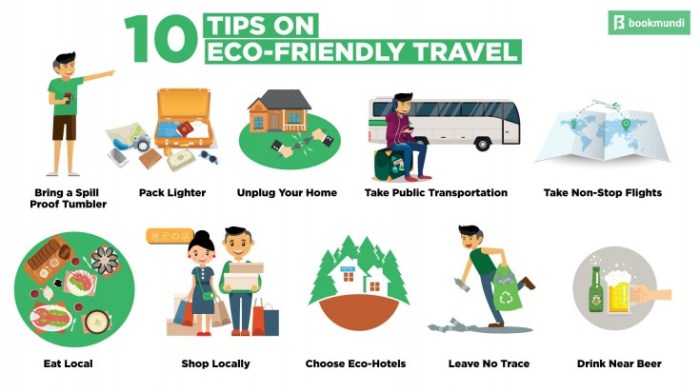Eco-friendly travel tips – Embark on a journey towards eco-friendly travel, where every step you take is a conscious choice to preserve the planet. Discover how to explore the world responsibly, leaving a minimal environmental footprint while enriching your travel experiences.
From mindful transportation options to sustainable accommodation, engaging activities, and conscious dining habits, this comprehensive guide empowers you to embrace eco-tourism and create lasting memories without compromising the well-being of our shared planet.
Transportation

Eco-friendly travel encompasses various aspects, and transportation plays a crucial role. By embracing sustainable modes of transportation, travelers can significantly reduce their carbon footprint and contribute to a healthier planet.
If you’re planning a beach holiday, be sure to pack all the essentials on the beach holiday packing list. But don’t forget to keep your travel eco-friendly by packing reusable items, such as a water bottle and shopping bag.
Consider using natural sunscreen to protect your skin and the environment. By making small changes, you can enjoy your beach holiday while minimizing your impact on the planet.
Public Transportation, Walking, and Biking
Opting for public transportation, walking, or biking instead of driving can bring numerous benefits. These modes of transportation not only reduce air pollution and traffic congestion but also promote physical activity and enhance the overall travel experience. Public transportation systems often provide convenient and affordable options, allowing travelers to explore cities without the hassle of parking or navigating unfamiliar roads.
Flying Responsibly
Air travel is a significant contributor to carbon emissions. However, there are ways to reduce the environmental impact of flying. Choosing airlines with fuel-efficient aircraft and opting for direct flights can minimize emissions. Additionally, carbon offset programs allow travelers to invest in projects that reduce greenhouse gases, neutralizing the carbon footprint of their flights.
Eco-Friendly Car Rentals
If driving is necessary, consider renting an eco-friendly car. Many car rental companies offer hybrid or electric vehicles that consume less fuel and produce fewer emissions. By choosing these options, travelers can minimize their carbon footprint while enjoying the flexibility of having a car.
Eco-friendly travel tips help you minimize your environmental impact while exploring the world. If you’re looking for an adrenaline rush, consider extreme sports vacations. From skydiving to bungee jumping, these activities offer an unforgettable experience while allowing you to connect with nature in a unique way.
After your adventure, continue practicing eco-friendly travel tips to protect the environment for future generations.
Accommodation

The environmental impact of accommodation varies depending on factors such as energy consumption, water usage, and waste generation. Choosing eco-friendly hotels or vacation rentals can help reduce your carbon footprint.
To choose eco-friendly accommodation, look for establishments that:
- Use renewable energy sources, such as solar or wind power.
- Have energy-efficient appliances and lighting.
- Conserve water by using low-flow toilets and showerheads.
- Reduce waste by recycling and composting.
- Use eco-friendly cleaning products.
Reducing Energy Consumption in Your Accommodation
In addition to choosing eco-friendly accommodation, you can also take steps to reduce energy consumption during your stay:
- Turn off lights and unplug electronics when not in use.
- Close curtains and blinds to keep heat in during the winter and out during the summer.
- Adjust the thermostat to a moderate temperature.
- Take shorter showers.
- Hang laundry to dry instead of using a dryer.
Activities: Eco-friendly Travel Tips

Engage in eco-friendly activities and tours that support local communities and minimize environmental impact. Respect local cultures and ecosystems by adhering to guidelines and refraining from harmful practices.
Embark on an eco-conscious journey by incorporating eco-friendly travel tips into your itinerary. By embracing sustainable practices, you’ll not only reduce your environmental footprint but also contribute to preserving destinations for future generations. Discover practical ways to minimize your impact on the planet while exploring the world.
Minimize waste and pollution during activities by bringing reusable items, disposing of waste properly, and choosing low-impact transportation options.
Nature-Based Activities
- Go hiking or biking on designated trails, avoiding sensitive areas and wildlife habitats.
- Explore nature reserves and parks, respecting wildlife and vegetation.
- Engage in birdwatching or wildlife viewing from a distance, minimizing disturbance.
- Participate in guided tours led by knowledgeable locals who can provide insights into the environment.
Cultural Immersions
- Visit local markets and support small businesses that use sustainable practices.
- Learn about traditional crafts and techniques that are environmentally friendly.
- Attend cultural events and performances that showcase local traditions.
- Engage with local communities respectfully, learning about their customs and values.
Food and Dining
The food choices we make can have a significant impact on the environment. The production, transportation, and disposal of food all contribute to greenhouse gas emissions, water pollution, and land degradation. By making more sustainable choices about what we eat and where we dine, we can help reduce our environmental footprint.
One of the most important things we can do is to choose restaurants that are committed to sustainability. Look for restaurants that use local and organic ingredients, compost their food waste, and have a low carbon footprint. When it comes to choosing dishes, opt for plant-based options or sustainably sourced seafood. These choices have a lower environmental impact than meat-based dishes.
Reducing Food Waste and Packaging, Eco-friendly travel tips
Food waste is a major problem, both environmentally and economically. In the United States, we waste about 40% of the food we produce. This wasted food ends up in landfills, where it decomposes and produces methane, a potent greenhouse gas. We can reduce food waste by planning our meals ahead of time, buying only what we need, and storing food properly. We can also compost our food scraps instead of throwing them away.
Packaging is another major source of waste. Avoid single-use plastics and opt for reusable containers and utensils instead. Bring your own bags to the grocery store and farmers market, and choose products that are packaged in recyclable or compostable materials.
Packing and Gear
Packing light and choosing eco-friendly materials are essential for eco-friendly travel. Every extra pound you pack increases your carbon footprint, and many conventional packing materials contribute to plastic pollution. By following these tips, you can reduce your environmental impact while still enjoying a comfortable and organized trip.
Reducing Plastic Waste
- Use reusable packing cubes instead of single-use plastic bags.
- Bring your own reusable water bottle and coffee mug.
- Avoid using plastic utensils, straws, and plates. Instead, opt for reusable alternatives made from bamboo, stainless steel, or glass.
- Pack snacks in reusable containers instead of single-serving plastic packaging.
- Bring a reusable shopping bag for any purchases you make along the way.
Packing and Organizing
Efficient packing and organization can also reduce your environmental impact. By maximizing space and minimizing clutter, you can avoid checked baggage fees and the need for additional luggage, which can both contribute to greenhouse gas emissions.
- Roll your clothes instead of folding them to save space and prevent wrinkles.
- Use packing cubes to organize your belongings and keep them tidy.
- Consider leaving behind non-essential items and purchasing them at your destination if needed.
- If you must check baggage, choose a suitcase made from recycled materials.
- Avoid packing fragile items in single-use plastic bubble wrap. Instead, use reusable packing materials like old towels or newspapers.
Travel Etiquette
Respecting the environment and local customs is essential for eco-friendly travel. It involves understanding and adhering to local rules, regulations, and social norms. Being mindful of your actions can help preserve the environment, protect wildlife, and ensure a positive experience for both travelers and locals.
Reducing Noise Pollution
Excessive noise can disturb wildlife, disrupt local communities, and ruin the tranquility of natural areas. To minimize noise pollution, consider the following tips:
– Speak softly and avoid loud conversations, especially in quiet areas like parks and nature reserves.
– Use headphones when listening to music or podcasts.
– Avoid driving vehicles off-road or at excessive speeds.
– Be respectful of wildlife by maintaining a safe distance and avoiding sudden movements.
Minimizing Litter
Littering not only harms the environment but also affects the aesthetic appeal of natural areas. To minimize your impact, make a conscious effort to dispose of waste properly:
– Carry a reusable water bottle and refill it instead of purchasing single-use plastic bottles.
– Bring reusable bags for shopping and avoid using plastic bags.
– Dispose of trash in designated bins or carry it out with you.
– Recycle whenever possible, and educate yourself about local recycling programs.
Supporting Local Communities and Businesses
Supporting local communities and businesses not only benefits the local economy but also helps preserve cultural traditions. Consider these strategies:
– Choose locally-owned accommodations, restaurants, and tour operators.
– Purchase souvenirs from local artisans and craftsmen.
– Engage with local people, learn about their culture, and respect their traditions.
– Support conservation efforts and community projects that protect the environment and local heritage.
Final Conclusion

As you embrace these eco-friendly travel tips, you not only minimize your environmental impact but also elevate your travel experiences. By respecting local cultures, supporting sustainable businesses, and minimizing waste, you become an ambassador for responsible tourism, inspiring others to follow in your footsteps. Remember, every choice you make has the power to shape a more sustainable future for travel.
Key Questions Answered
What are the benefits of using public transportation when traveling?
Public transportation significantly reduces carbon emissions compared to driving, eases traffic congestion, and promotes a more sustainable urban environment.
How can I choose an eco-friendly hotel or vacation rental?
Look for accommodations that prioritize energy efficiency, water conservation, waste reduction, and support local communities. Certifications like LEED and Green Key can guide your search.
What are some tips for reducing food waste while traveling?
Order smaller portions, share meals, request doggy bags for leftovers, and choose restaurants that prioritize sustainable food sourcing and minimize packaging.